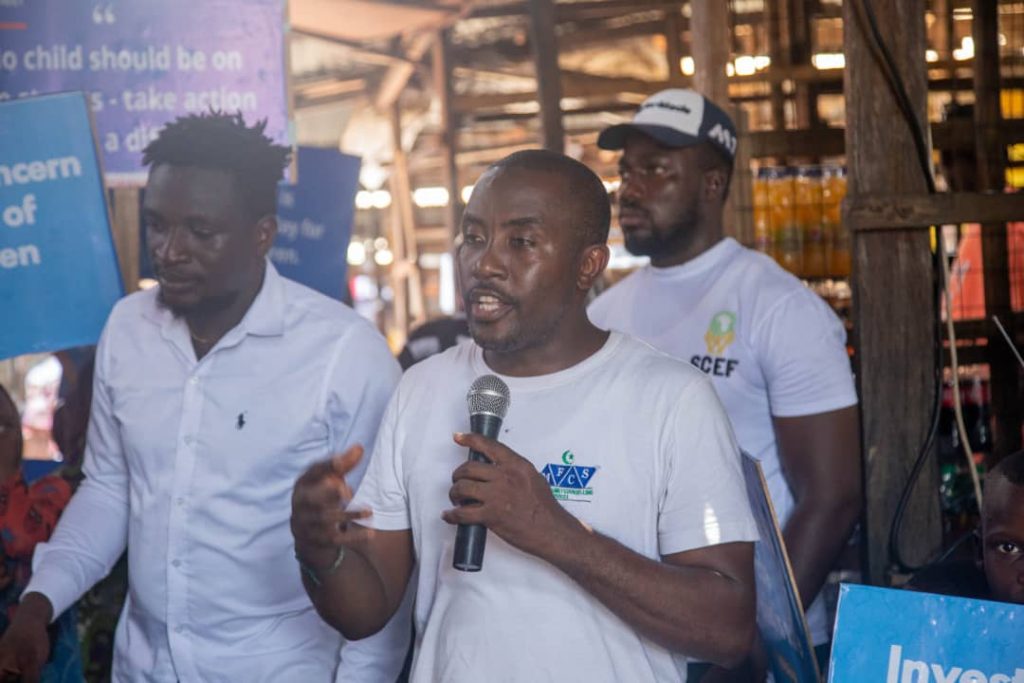By Albert Allotey
Accra, April 16, GNA – A consortium of non-governmental organisations led by Street Children Empowerment Foundation have commemorated this year’s International Street Children Day with street-connected persons at Kantamanto in Accra to educate them on their rights.
Other organisations are Street Girls Aid, Chance for Children, Shelter Africa, Muslim Family Counselling Services, and Friends in Need Foundation.
The International Street Children Day has been set aside to be observed on April 12 every year to raise awareness about the hardships that the street-connected persons go through.
During the event, some of the children carried placards, which read “Give Street children a safe place to sleep and access to education,” “Until every child is safe, no child is safe,” “Our primary concern is the safety of street children,” and “Being on the street does not mean we have no rights.”
Mr Paul Semeh, the Executive Director of the Street Children Empowerment Foundation in an interview with the Ghana News Agency said, “It is about time politicians – parliamentarians and ministers come out from their comfort zones and draw near to the vulnerable in society and sensitise them on their rights.”
He said this would help the marginalised to demand their share from government, churches, parents, teachers, community leaders, and through that together to solve a perceived complex problem.
“Speaking as a country or person working in this area for 13 years, mostly we will have this international day for street children in a nice conference hall with nice refreshment and we forget the people that we are commemorating the day for.
“The people do not know what they are observing or celebrating; they do not know the rights they have; they do not know what the republic is offering; and what the world is offering for them. There is the need for the street children to know their rights to make demands,” he added.
He said: “This day is not a day of celebration. It is a day where we all know and want to identify with their struggles. No child born of a man and woman should live in this state. According to international decree they should not be denied their right to education, shelter, food and nutrition, proper care, and upbringing.”
Mr Semeh said the numbers of street children around Kantamanto area were increasing and that the state actors, the parliamentarian, ministers needed to invest in them by dialoguing with them to know that they were not living the best of lives.
“This is Katamanto, the original place where all corporate Ghanaians come to shop. Yet we have closed our eyes to the rising number of street children and the abuse in the area. We just come and use the place and go. We need to invest in them by spending time with them.” He stated.
Reverend Seyram Akotey, Co-founder, Shelta Africa said the network of NGOs were doing their part in supporting the less privileged children in the country by providing educational scholarships, skills training, among others, but the task was huge.

He called on government organisations that have been tasked with the responsibility of taking care of the destitute in society to put in a coordinated efforts in involving public private partnership, to create avenues for otherwise deprived persons to find a hope in life.
“It is also a matter of priority setting and funding. This whole area of our society looks as if it is completely neglected. We hear of our free SHS and so on. However, what that is doing on the ground is yet to be seen.
“For the evidence we see here in the inner city of Accra, we have a problem as a lot of our young children growing without hope ending up as destitute adults and for a society it does not reflect well on us.
“It is quite disproportionate polarisation of our society. There is the poor and the rest. So, it would be a deliberate effort if not just on the part of government, certainly government and private working together. There are a lot of people or charities like we who have put ourselves to try to drive those things. We operate with limited resources. So, what we do come from our personal fundings.
GNA